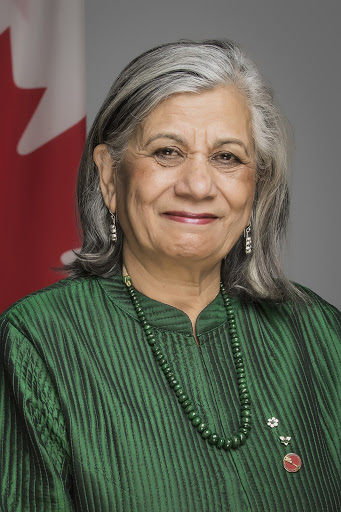There are more than 6,500 lobbyists registered in Canada, but few are advocating to improve the lives of immigrants and newcomers in this country.
Senator Ratna Omidvar says one single federal-level organization representing immigrants would help get their concerns on the parliamentary agenda. There are nearly 8 million people with permanent residence status in Canada.
“What we are missing in Canada is a more macro, global group, a Canadian group that speaks for immigrants per se. Unlike the U.S., where there is an organization for New Americans, we do not have that at the national level in Canada. And I believe that is a real gap,” says Omidvar, an Indo-Canadian who has advocated for immigrants and fought to reduce inequality through much of her career.

Omidvar and 19 other senators are pushing for the approval of an inquiry to examine the links between Canada’s prosperity and immigration.
“The Senate is an important site to launch this kind of inquiry because the senators are not tied to electoral battles. And immigration and Canadian prosperity have to be viewed not just in the short term but in the long term,” Omidvar said.
Omidivar says immigrants are essential to ensuring a prosperous Canada and the inquiry will focus on “what we must do, what we must change” to ensure immigrants feel even more empowered to contribute in the future.
Omidvar believes there needs to be a shift in the language from “high skills” and “low skills” to focus on “essential skills” as the government determines who we need to bring to Canada, and what we need to make Canada safe and prosperous for all.
Immigration Not a Top Issue
Among the 51 subject matters listed in parliament lobbying records, economic development is the top issue while immigration ranks 28th.
Language barriers, finding jobs commensurate with qualifications and housing affordability are among some of the top issues immigrants face, yet no single organization addresses them in bulk.
There are a range of organizations that lobby the government on related immigration issues such as post-secondary institutions pushing for more international students, or organizations and companies interested in bringing in temporary foreign workers or skilled labour — but they are motivated by their self-interests, not the interests of immigrants. There are also groups such as the Canadian Council of Refugees that lobby on behalf of those without status, but none representing those who identify as immigrants.
“Immigration is not the top issue for most businesses,” says Duff Conacher of Democracy Watch, a citizen advocacy group that focuses on government accountability. Connacher points out that the citizen groups representing immigrants and refugees don’t usually have a lot of money to hire lobbyists to launch campaigns and meet with government officials.
“In lobbying, it’s the squeaky wheel that gets oiled,” says Connacher. “The more people you have, the more money, the more lobbyists you have – the more likely the government is to respond.”
Immigration Can’t Be “Partisan”
Right now, Canada’s population stands at 37.8 million people. More than one in five are immigrants. Century Initiative, a non-partisan network of Canadians from the business, academic and charitable sectors is advocating for a plan for economic growth based on increasing the country’s population to 100 million by the year 2100.

“Immigration has to be the key driver of that growth”, says Lisa Lalande, the CEO of Century Initiative. What she means by that is our workforce is shrinking as the population ages. She points to a recent Statistics Canada report that found Canada’s population growth rate is at its lowest since World War I.
“If our population doesn’t grow, the key industries will become less dynamic, less productive, less competitive,” says Lalande, adding it also means Canada will have diminished influence on the world stage. An aging population also means fewer young people working and supporting the older generation, which ultimately results in a smaller tax base to pay for healthcare, education, roads and bridges.
“Over time, that will erode our quality of life, the standard of living, and the cultural fabric of Canada,” says Lalande.
The resistance to Century Initiative’s strategy is rooted primarily in three main arguments based on housing, environment and employment. Some are concerned that an influx of immigrants will increase competition for housing and drive up prices. Then there are worries that rapid population growth will negatively impact the environment. And finally, there are fears that jobs will be lost to new immigrants.
Lalande and her team want to tackle these questions head-on and prevent them from being politicized as it is in the United States.
“Immigration cannot and can never be a partisan issue in Canada. We don’t expect it to be an issue in the next election… If it becomes (partisan), then it is at the risk of the future of our quality of life in Canada,” says Lalande.
Social Cohesion
Senator Omidvar cautions that Canada’s immigration goals must not be based just on economic equations but also take into account social cohesion.
Omidvar says the recent deliberate “hate-filled” attack on a Muslim family in London, Ont. has put to test Canada’s perception of itself as a welcoming society. On June 6, 2021 a 20-year-old Canadian man in London rammed his truck into a Muslim family out for an evening walk. Four members of the Afzaal family were killed, while a 9-year-old boy was seriously injured.
“It is contrary to every image of Canada that we want to promote,” said Omidvar.
Although the crime was perpetrated by one individual, Omidvar worries about others who might be out there espousing such hate on social media. Omidvar says we can’t counter such dangerous attitudes with aspirational messages, adding that acceptance requires the hard work of building relationships between Canadians and immigrants.
“I think the best thing to do is to not spread aspirational messages such as diversity is our strength, we are multicultural… Those are symbolic statements,” she said. “What we need to do is get down to the grassroots, in the local communities and make sure that the local communities are working with the neighbourhoods (and) public institutions, to make sure that people are interacting with each other and normalizing differences.”
Omidvar says she also wears clothing from her homeland when she wants to relax and be comfortable. She remembers arriving in Canada decades ago, with no ties to the community and how becoming a member of a local gardening club gave her a reason to interact with her neighbours.
“It was those little instances of interaction that helped me integrate in the community,” says Omidvar.
She warns that “in our eagerness to meet the labour market demands, we have gotten used to becoming a little too transactional.” She says immigration policies also need to focus on acceptance and building bridges across cultures.
“Immigrants have lives and cultures,” she said. “How we normalize differences in this country over the longer term is something that we need to grapple with in the beginning as opposed to reaction to hateful incidents.”
Naser Miftari is an independent media researcher. His broad area of interest is in political theory and his research focus is on the future of public broadcasting, media governance and political economy of communication. For more than ten years he was a writer and editor for Koha Ditore one of leading newspapers in South East Europe. He is an active contributor in media research studies and has also taught graduate and undergraduate courses in media and political science at colleges and universities in United States and South East Europe. More recently he served as a contributor on global journalism issues with the Toronto-based Canadian Journalists for Freedom of Expression (CJFE) and in 2016 he was a research fellow at King’s College in New York.






I am.